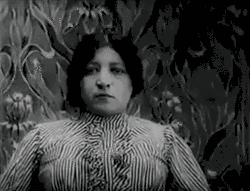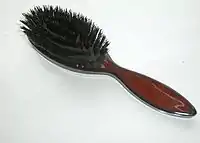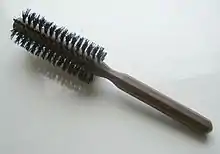Hairbrush
A hairbrush is a handle brush with rigid or soft spokes used in hair care for smoothing, styling, and detangling human hair, or for grooming an animal's fur. It can also be used for styling in combination with a curling iron or hair dryer.


A flat brush is normally used for detangling hair, for example after sleep or showering. A round brush can be used for styling and curling hair, especially by a professional stylist, often with a hair dryer. A paddle brush is used to straighten hair and tame fly-aways. For babies with fine, soft hair, many bristle materials are not suitable due to the hardness; some synthetic materials and horse/goat hair bristles are used instead.
Animal use
Special brushes are made for cats, dogs and horses. Two different brushes can be made specifically for either short haired pets, or long haired pets. For an equine's tougher hair, a curry-comb is used.
Types


Various types of brushes are used for different purposes, or have special features that are beneficial to certain hair types. For example:
- Round brush: Usually used with a blow dryer to add fullness and movement to the hair. Some have a metal or ceramic base which is designed to heat up during blow drying.[1]
- Vent brush: Vents allow more air flow between the bristles but does not affect the drying time.[1]
- Cushion brush: Bristles are mounted on a rubber cushion or mat for added flexibility, to minimize hair breakage during detangling. Denman manufactures a popular line of cushion brushes.[1]
- Paddle brush: A wide base allows more exposure while blow drying; flexible teeth are designed to minimize breakage, though some believe it does not work.[1]
- Detangler brush: Features such as widely spaced, flexible, nylon teeth are designed to be gentle on tangled or knotted hair.[1]
- Boar bristle brush: Tightly spaced boar-hair bristles are designed to increase tension while brushing, to smooth the hair.[1]
The effects of brushing will be different depending texture and whether the hair is wet or dry. Straight hair typically looks smoother when brushed. Curly hair tends to expand when brushed while dry.
Materials
Common materials used for the handle are ebony, rosewood, New Guinea rosewood, beech, ABS plastic and polyacetal. Common materials used for bristles include boar bristle, horsehair, nylon, stainless steel and goat hair.
United States history
The earliest U.S. patent for a modern hairbrush was by Hugh Rock in 1854.[2] A brush with elastic wire teeth along with natural bristles, was patented by Samuel Firey in 1870 as U.S. Patent 106,680. In 1898, Lyda D. Newman invented an "Improved Hairbrush," which allowed for easy cleaning and had bristles separated wide enough to allow for easily combing. She was awarded U.S. Patent 614,335.[3][4][5]
See also
References
- "Hair Brush 101 – What You Need to Know". Mandy McCullough. August 27, 2013.
- US Design Patent #D645
- David M. Foy (2 February 2012). Great Discoveries and Inventions by African-Americans: Fourth Edition. AuthorHouse. pp. 63–64. ISBN 978-1-4685-2435-2.
- Evia L. Davis (1999). African American Awareness for Young Children: A Curriculum. Good Year Books. p. 18. ISBN 978-0-673-58645-2.
- "Lyda Newman". Famous Women Inventors. Retrieved 20 March 2014.
External links
| Wikimedia Commons has media related to Hairbrushes. |